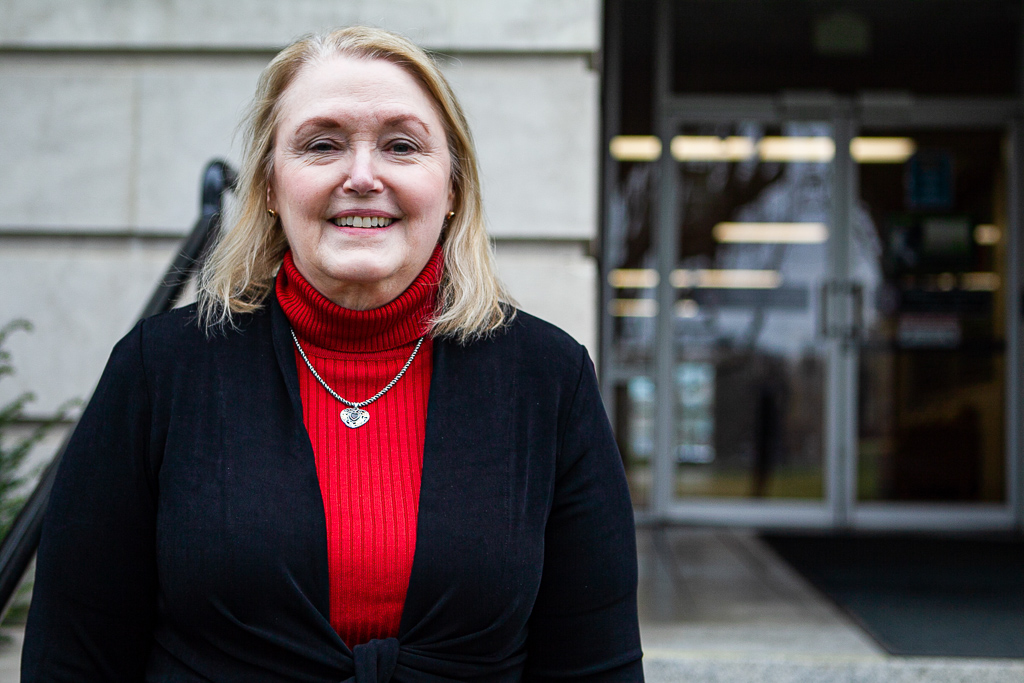Dr. Deborah Madden, a primary care physician from the continuity of care/medical education clinic of the Roseburg VA Medical Center, believes every Veteran’s life story is important. Through the VA My Life My Story program, she is helping Veterans give voice to their legacies.
The My Life My Story program is part of VA’s Diffusion of Excellence initiative, which helps spread local clinical innovations that improve patient care throughout the VA system. A Gold Status Project, it was first launched in 2013 at the William S. Middleton Memorial Veterans Hospital in Madison, Wisconsin, and has spread to 50 VA facilities.
Using semi structured questions, VA staff, interns, medical students, or trained volunteers interview Veterans about their life experiences. They then write a 1,000-word narrative. The narratives not only honor the Veteran’s military service but sheds light on what is most meaningful to them—their family, friends, hobbies, or career.
As part of the process, the interviewer reviews the narrative with the Veteran, helping to transform a traditional, problem-based medical visit into a personalized, patient-centered engagement. Together, they revise and complete the narrative, and, with the Veteran’s permission, it becomes part of their medical record. Patients are assured their story is private and it stays within VA.
VA Geriatric Scholars Program
In 2018, Dr. Madden participated in the VA Geriatric Scholars Program, a workforce development program to integrate geriatrics into primary care practices. A core learning component for all scholars is to develop a local quality improvement (QI) project relevant to the needs of patients at their facility. Dr. Madden decided that, for her QI project, the implementation of My Life My Story aligned with her team’s commitment to patient-centered care.
As part of her role with VA, Dr. Madden educates the next generation of clinicians as a medical preceptor, mentoring medical students who choose to gain clinical experience at the Roseburg VA Medical Center. Dr. Madden involved her students in her quality improvement project as part of their learning experience.
VA Geriatric Scholars use the Plan, Do, Study, Act (PDSA) method of conducting rapid cycles of QI. During PDSA cycle one, Dr. Madden’s students were trained to perform the interview and document the narrative in the patient’s medical record. The QI team tracked weekly whether the students had completed a narrative. By the end of cycle one, not all had fulfilled the requirement. In response, Dr. Madden approached the deans of the students’ medical schools, who agreed to make the completion of the narrative a requirement of the students’ rotation.
During PDSA cycle two, the completion rate reached 100%. By the end of PDSA cycle three, the students had sustained a 100% completion rate. And, their view of the assignment had shifted to something they wanted to do rather than had to do.
Builds rapport
Chris Shawl, a fourth-year medical student from Pacific Northwest University, showed enthusiasm from the start. “I thought it was a great idea. I enjoy building rapport with patients,” said Shawl. He completed four narratives over his 20-week student rotation.
“It was the first time they ever opened up about aspects of their life story they had never talked about to any other provider,” said Shawl. Veterans talked about their war experiences, but they also shared details of their life that contribute to who they are today.
Shawl was inspired by a Vietnam Veteran, a professor, who started programs at his college to help Veterans obtain a degree. “Based on what he saw when he came back from Vietnam, it spurred him to make a difference,” said Shawl.
“One or two of them had their spouse there, too, which was supportive,” said Shawl. “A lot of the stories involved when they first met, what they were doing, what they were wearing. ‘I never knew that’ came up once or twice.” “They hear things they didn’t know about their loved one,” added Dr. Madden.
One Veteran recently lost his significant other. “The idea of being interviewed about his life story was challenging at first,” said Shawl. “But I spent a few days getting to know him, and he was able to share about his significant other and multiple stories from his time in military service. This opened up a lot of different things.”
Leads to patient satisfaction
My Life My Story interviews develop patient-provider trust. The benefits of that trust become longitudinal as the Veteran’s primary care team refers to the narrative to proactively develop and nurture the patient-provider relationship during future clinical visits. “You find common ground to build rapport,” said Shawl.
Veterans conveyed improved patient satisfaction. “I think they were surprised that VA was interested in knowing their stories,” said Shawl. One Veteran said afterwards, “I really appreciate this. You reached out to me. I’m glad there’s an interest in getting to know me.”
Dr. Madden strongly supports VA’s commitment to patient-centered care. She hopes to expand her scholar project to include other learners who are receiving training at the Roseburg VA Medical Center, including pharmacy students, pharmacy residents, and family medicine residents.
“Everybody has a story,” said Shawl. And, Dr. Madden and her colleagues continually prove to Veterans that VA and their health care team values their stories.
An alumna of the 2018 VA Geriatric Scholars Program, Dr. Deborah Madden demonstrates how her primary care team is delivering on the VA Office of Patient Centered Care and Cultural Transformation’s goal of honoring the service of Veterans and empowering them to actively participate in their care.
Topics in this story
More Stories
Veteran Byron Potier weighed almost 300 pounds and was tired and lethargic. He was the perfect candidate for gastric sleeve surgery.
How much do you know about VA care, benefits and services? Don’t miss out on what you've earned—check out the "2025 VA Federal Benefits Guide for Veterans, Dependents, Survivors, and Caregivers" handbook to learn more.
Feeling stressed? Your breath can help you relax and focus. Take 3 minutes to reset and prioritize your well being for this week's #LiveWholeHealth practice.






